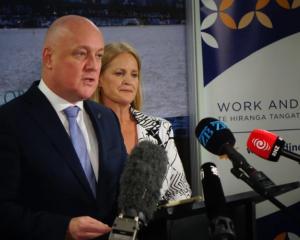
Warning: This story contains descriptions and language associated with child sex offending.
A New Zealand man who paid $80 to sexually abuse a child in a Manila hotel room has had his claim for permanent name suppression dismissed by the Court of Appeal.
Video of the sickening crimes was also distributed by the man on social media channels WhatsApp and Twitter, while more than 14,000 objectionable images were later found on his computers.
As part of an ongoing investigation into New Zealanders involved in the international online exploitation of children, the New Zealand Herald published details of how the man was caught and prosecuted by New Zealand Customs in July.
After his name suppression lapsed today, he can now be revealed as Aucklander Earl Reyes.
Earlier this year Reyes was sentenced to six years and five months' imprisonment after pleading guilty to 13 charges for indecency and objectionable publication offences in the Waitakere District Court.
Despite being denied permanent name suppression by Judge June Jelas, the 32-year-old continued to fight for secrecy - eventually taking his case to New Zealand's second highest court.
Reyes' challenge to the Court of Appeal, however, was one which the judges acknowledged raised a question of public importance.
That is, when will adverse effects on a parent's health, associated with publication of their child's name as a convicted sex offender, constitute extreme hardship for the parent, allowing for the permanent suppression of their child's name?
Reyes' appeal was based on the same earlier circumstances about his mother, who was facing imminent surgery and treatment for cancer.
He argued publication would adversely affect his mother's already bad health, and materially adversely affect her chance of recovery.
The sex offender had earlier been granted interim name suppression for three months by the High Court's Justice Christian Whata to assist Reyes' mother's recover and treatment.
But he also said: "The public interest in publication of his name is very strong. There should be no expectation of ongoing suppression beyond this timeframe."
He did, however, grant leave for Reyes to apply for permanent name suppression when the temporary suppression expired - which he did.
In early August, however, Justice Matthew Palmer declined that application, although he said there was no doubt publication would be distressing to Reyes' mother.
In dismissing Reyes' final appeal this month, the Court of Appeal Justices Denis Clifford, Rebecca Ellis and Mary Peters said: "Like all the judges who have considered the position of Mr Reyes' mother, we have no doubt publication will cause her and her husband — as it would any parents — distress.
"But, as noted, the test [for permanent name suppression] is a demanding one. It places the emphasis very much on the importance of an open justice system and requires a real risk of 'extreme hardship' to be established before the court may consider suppression.
"We do not think that either Judge Jelas or Justice Palmer were wrong when they concluded that had not been established in these circumstances."
Court documents released to the Herald showed Reyes had travelled to Manila in September 2016.
He immediately made his way to a hotel where he would pay someone $80 to film himself sexually abusing a child.
But it was not until July last year that Reyes' offending was first detected and Customs would find he had more than 14,000 objectionable images on his computers.
Nearly 12,500 were depicting the sexual exploitation or abuse of children, while 3573 were classed in the highest category of child exploitation material and included images depicting sadism and bestiality.
Customs was first notified of the crimes with a report of a New Zealander uploading material depicting child sexual exploitation using an instant messaging app first from the app's Canadian designer.
The company also provided Customs investigators with several IP addresses and the user details of the suspect.
Further inquiries linked an IP address to a home in Glenfield, which was raided in August last year.
But it was when a senior Customs officer interviewed Reyes that a shocking admission was made.
Reyes confessed to travelling to the Philippines capital and paid someone $80 for access to a boy for two hours in Manila's Icon Hotel North ESDA.
While there he filmed the boy being sexually abused before later uploading the videos to the internet for other offenders around the world.
The boy, Reyes told the Customs officer, was about 14 or 15 years old.
Further inquiries found the Department of Internal Affairs (DIA) received an alert for Reyes' computer user name from the United States National Center for Missing and Exploited Children in January 2018.
The DIA had also received a warning about his email address, which was initiated by Google after two child exploitation videos uploaded in December 2017 were linked to a New Zealand IP address.
One of the videos, the details of which are too graphic to publish, is understood to be well-known to international law enforcement agencies and shows the abuse of a 16-month-old boy.
The video was on Reyes' laptop, court documents show.
Other Kiwis reported on by the Herald this year who were caught sharing and downloading images of sexually exploited children include a Waiheke Island man and son of a former police officer.
• If you've experienced sexual assault or abuse and need to talk to someone you can call the confidential Safe to Talk crisis helpline on: 0800 227 233











